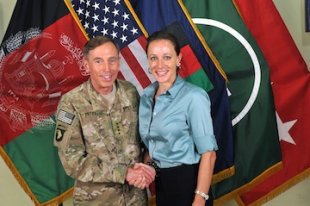KABUL, Afghanistan (AP) — A top Afghan peace mediator hailed Pakistan's recent decision to free nine members of the Taliban who favor negotiations, saying Saturday it was a sign Islamabad is willing to help bring the militant group to the table and end Afghanistan's 11-year-old war.
The cooperation of Pakistan, which has longstanding ties to the Taliban, is seen as key to jumpstarting the stalled Afghan peace process. The Afghan and U.S. governments accuse Islamabad of backing insurgents — an allegation Pakistan denies — and say many militant leaders are hiding in the country.
Afghanistan needs Pakistan's help in reaching out to top Taliban leaders, but still insists that peace talks be led by Afghans, saying it will fight those who try to interfere.
Salahuddin Rabbani, the head of the High Peace Council who led a delegation to Islamabad this week, said Pakistan's prisoner release marked a shift in the neighboring country's policy. In the past, the Pakistanis have arrested Taliban figures interested in peace talks with the Afghan government, he said, but now the government is releasing them and pledging to give them safe passage to negotiations.
"It seems that Pakistani officials have realized that a close cooperation between Afghanistan and Pakistan can be effective for the peace initiative," Rabbani said. "Of course, this is a vision we have been insisting on for a long time."
Rabbani, whose delegation spent four days in Islamabad this week meeting with high-ranking government, political and religious leaders, said Pakistan has pledged to release additional Taliban prisoners who will be allowed to stay in Pakistan, return to Afghanistan or seek residence in a third country. While nothing can guarantee they won't rejoin Taliban fighters, Rabbani said he was confident that they would continue to cooperate with the peace council. "We will be in contact with those released," he said.
Some members of the peace council suggested that Pakistan's religious and political leadership might be having a change of heart — in part because of violence committed by Pakistan's branch of the Taliban movement.
"This is the first time that we really saw some changing of the minds while we were speaking," said Qayumuddin Kashaf, a member of peace council and head of the top religious council in Afghanistan. He said that in the past, Pakistani religious leaders insisted that insurgents were waging a holy war in Afghanistan. "Now we see some changing of the mindset because the security situation in Pakistan is very bad if not worse than Afghanistan."
Others in Kabul believe, however, that Pakistan may simply be playing a waiting game, trying to appease Afghanistan with small gestures until international troops leave Afghanistan and the Taliban can try to mount a comeback.
Despite the prisoner release, the peace process still has little traction and has experienced many setbacks, including the assassination of Rabbani's father in September 2011. Burhanuddin Rabbani, a former Afghan president and the first leader of the peace council, was killed in his Kabul home by a suicide bomber posing as an emissary from the Taliban.
It's unclear whether the Taliban are interested in negotiating peace, but the insurgent group welcomed the release of the prisoners. "Without a doubt, releasing prisoners fosters confidence between two neighboring countries and their nations," Taliban spokesman Zabihullah Mujahid said in a statement issued Friday.
During the delegation's trip, both countries appealed to the Taliban to join the peace process and sever ties with al-Qaida and other international terror networks. They said Pakistan, Afghanistan and the United States would provide safe passage to members of the Taliban who want to talk with negotiators.
They agreed to work with the international community to remove prospective Taliban negotiators from the U.N. sanctions list so they can participate in any peace talks. The sanctions include a travel ban, arms embargo and assets freeze.
Afghanistan and Pakistan also agreed to hold a conference of religious leaders and scholars from Islamic countries to address violence in the name of Islam, council members said.
The peace council did not identify the prisoners who were freed, but an Afghan official familiar with the peace process gave The Associated Press a list of eight. They were:
—Nooruddin Turabi, former Taliban justice minister.
—Jahangirwal, a special assistant to Taliban leader, Mullah Omar.
—Qutub, a Taliban leader.
—Abdul Salaam, former Taliban governor of Baghlan province.
—Maulvi Matiullah, the Taliban's director of the customs house in Kabul.
—Mahamad, the Taliban's former governor of Kunduz province.
—Sayed Saduddin Agha, a former Taliban commander.
—Allah Dad, the Taliban's former deputy minister of communication.
The ninth prisoner released was Anwarul Haq Mujahid, the son of the late Mohammad Yunus Khalis, who fought against the Soviets in Afghanistan in the 1980s. He has joined his family in the northwestern Pakistani city of Peshawar, according to a cousin and family friend who spoke on condition of anonymity because they were not authorized to talk to the media.
Afghan officials are still hoping for the release of the Taliban's former deputy leader, Mullah Abdul Ghani Baradar, who was captured in Pakistan in 2010. Baradar was reportedly conducting talks with the Afghan government that were kept secret from the Pakistanis.












